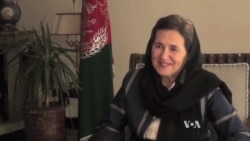"I may not raise my voice a lot, I may not be very flashy, but I like to interact with people," said Afghanistan First Lady Rula Ghani. Soft-spoken as she is, her voice, arguably the most prominent among Afghan women in decades, is being heard.
In an exclusive interview with VOA's Afghan service, Rula Ghani suggested the attention she's drawn, like her recent inclusion in Time Magazine's 100 Most Influential People in the world, may be premature. "It's only been six months since I've been first lady. I haven't done much yet and I hope I will be able to fulfill their prediction."
The bar was set low. Merely appearing in public with her husband, President Ashraf Ghani, has set her apart from predecessor Zeenat Karzai, who — despite the accomplished medical career that preceded her role as first lady — remained largely unknown to many Afghans.
But Rula Ghani also has an office in the presidential palace where she works on alleviating the plight of Afghans displaced by civil and international conflict. She also attends conferences on gender equality and religious tolerance.
Her abiding issue, however, appears to be women's rights, which, after being trampled under Taliban rule, remain limited in regions still under the militants' control. Asked about her husband's possible rapprochement with the Taliban, she says women shouldn't worry that gains made since the group's 2001 ouster would be reversed.
"If I know my husband .... and I don’t think any of these rights that women have acquired during these past few years will ever be put in question. People should be confident that this will not happen," she said, adding that Afghan women should take part in planned negotiations.
Ghani defines her role in advocating women's rights simply.
"I want to help Afghan women to feel comfortable in their own country and to be able to realize whatever their own personal goals are," she said.
It's an answer that could apply to her. An Afghan citizen, she is also Lebanese and American. Born into a Lebanese Christian family, she was educated in Paris as well as Beirut — where she met her husband — and New York, holding master's degrees in journalism and political science. Fluent in Arabic, French and English, she has learned Dari and delved deeply in Afghan issues.
It's a background that has drawn predictable criticism from conservative, patriarchal and nationalistic elements in overwhelmingly Muslim Afghanistan. But she remains undaunted by such views and believes women in Afghanistan will continue to make strides, even if it takes time.
"The women I see are very brave women, very strong women, women that are facing a lot of challenges and yet are up to the challenges and are making a very big effort," she said. "So I don’t see why one of them cannot become a president — one day."





